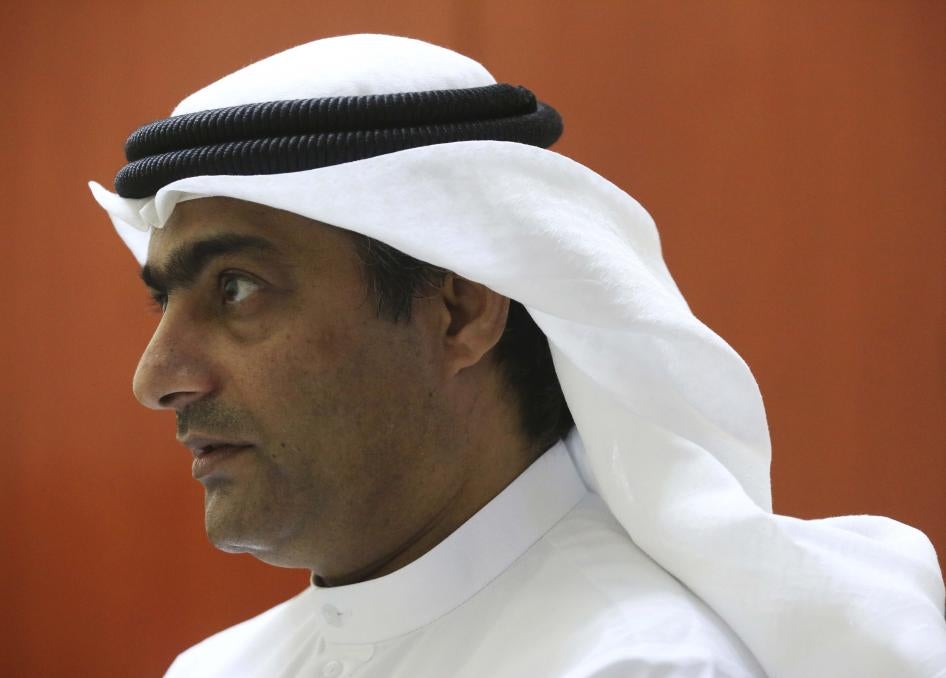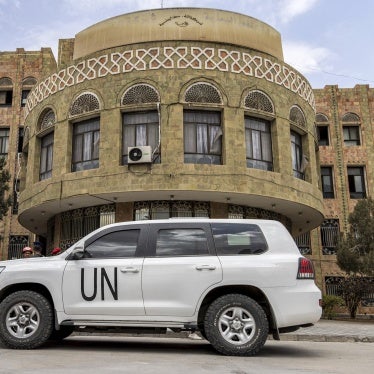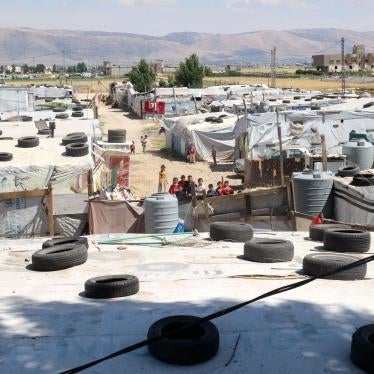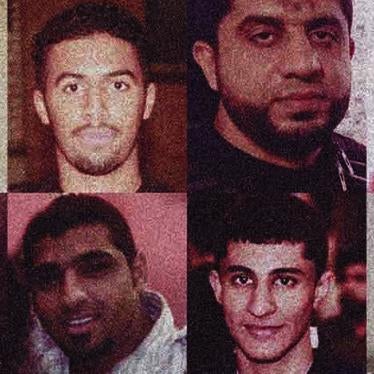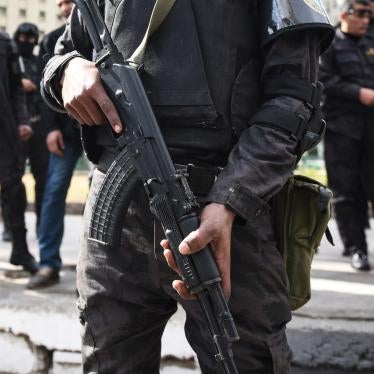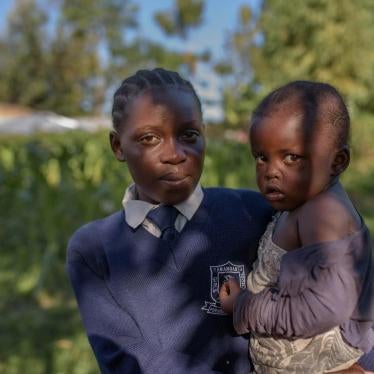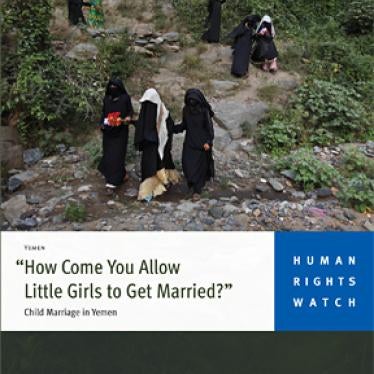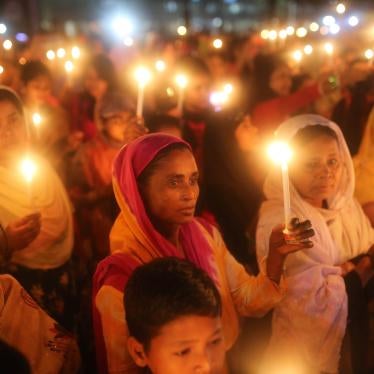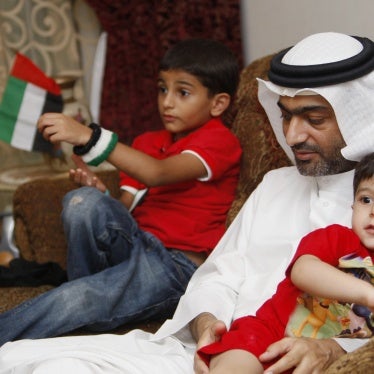(Beirut) – Emirati authorities are holding an unfair mass trial that has raised serious due process concerns, Human Rights Watch said today. The trial includes many defendants held in prolonged solitary confinement, which may amount to torture.
In December 2023, while hosting the United Nations Climate Change Conference (COP28), Emirati authorities brought charges against at least 84 defendants in retaliation for forming an independent advocacy group in 2010. Those on trial include prominent activists and dissidents already serving long prison sentences based on abusive charges, including Ahmed Mansoor, a prominent human rights defender; Nasser bin Ghaith, an academic; and Khalaf al-Romaithi, a businessman, as well as those convicted following the grossly unfair “UAE94” mass trial in 2013, many of whom have been held arbitrarily after their sentences ended.
“This unfair mass trial is a farce, and the allegations of torture and gross fair trial violations lay bare the UAE’s hollow rule of law and utter lack of access to justice,” said Joey Shea, United Arab Emirates researcher at Human Rights Watch. “Other countries and global businesses and celebrities partnering with the UAE should urgently call for an end to these abuses and for the release of human rights activists like Ahmed Mansoor immediately.”
The due process concerns include restricted access to case material and information, limited legal assistance, judges directing witness testimony, violations of the principle of double jeopardy, credible allegations of serious abuse and ill-treatment, and hearings shrouded in secrecy.
In a statement released January 6, Emirati authorities accused the 84 defendants of “establishing and managing a clandestine terrorist organization in the UAE known as the ‘Justice and Dignity Committee.’” The charges appear to come from the UAE’s abusive 2014 counterterrorism law, which sets out punishments up to life in prison and even death for anyone who sets up, organizes, or runs such an organization.
Human Rights Watch remotely interviewed informed sources and Emirates Detainees Advocacy Center (EDAC) representatives between late March and April 2024.
Human Rights Watch research indicates that many of the defendants have been kept in incommunicado solitary confinement for at least 10 months. Phone calls and family visits have been prohibited from between 10 months to a year, except for brief phone calls in December 2023, informing family members of the existence of the new case and instructing them to hire lawyers.
During the trial, defendants have repeatedly described abusive detention conditions, including physical assaults, lack of access to medical care and required medicines, incessant loud music, and forced nudity.
At a hearing on March 14, some defendants said that officials at the al-Razeen prison forced them to listen to extremely loud music during periods of rest and sleep, informed sources told Human Rights Watch. They said they were interrogated after long periods of loud music and forced to confess under duress and psychological exhaustion. Those who refused were punished with solitary confinement.
According to the EDAC, one defendant told the court after having spent 250 days in solitary confinement: “I do not know what time it is, and I do not remember anything from the Qur’an after I had memorized the Qur’an.”
Emirati authorities should investigate the alleged abusive conditions. Authorities should hold those responsible for any unlawful acts to account and immediately provide the defendants with adequate medical attention, Human Rights Watch said.
The unfair mass trial has been shrouded in secrecy, and Emirati authorities have prevented defendants’ lawyers from freely accessing case files and court documents. Lawyers have apparently not obtained physical or electronic copies of the court documents, relatives said, and are only able to view the documents on a screen in a secure room under the supervision of security officers. Informed sources said that the lawyers are not allowed to take photos of the documents and are only permitted to take handwritten notes.
Emirati authorities have also prevented family members from freely attending the trial. During some sessions, authorities did not allow relatives into the courtroom and instead forced them to watch the proceedings in another room via a livestream that was muted so that they could not hear the proceedings.
At a March 7 hearing, defendant Sheikh Muhammad al-Siddiq said: “We hope that before you sentence us to death, you will give us the opportunity to defend ourselves,” the EDAC reported.
While a January statement from the Emirates News Agency (WAM), the UAE’s official state news agency, claims the case is “public,” Emirati authorities have severely restricted access to the hearings, even for family members, and have kept basic details of the case secret, including the names of all the defendants. UAE allies, including the United States and United Kingdom, should send diplomatic representatives to attend the next trial session to monitor due process violations.
“No one knows who is on the list, no one knows who these 84 people are ... even those attending the trial don’t know,” one relative told Human Rights Watch.
At least 60 of the defendants were already convicted in 2013 for their involvement with the Justice and Dignity Committee, according to the EDAC. That raises concerns that Emirati authorities are violating the principle of double jeopardy, which prohibits trying people twice for the same offense after they had received a final verdict.
The prosecutor has not provided any new evidence, and the evidence cited in the hearings is based entirely on the UAE94 trial, the EDAC said.“It is the same case as 2013, there is no new evidence and it is the same allegations,” said one relative.
Family members have also expressed concern about the partiality of the presiding judge. During a hearing on December 21, one family member said, the judge “put sentences in the mouth of the witness.” The judge interrupted and intervened during the testimony by correcting the witness and dictating statements to him, family members and the EDAC said. The EDAC said that at one point, a police officer handed the witness a paper, which the witness then used to answer the remaining questions.
“This is not an independent trial; it is controlled by the government,” an informed source said. “The judiciary is under their hands, and they showed us from the beginning that they don’t care about the system or the laws.”
“A decade after the notorious UAE94 case, this new farcical mass trial proves that the UAE’s rights record has further deteriorated,” Shea said. “Ahmed Mansoor and the rest of these defendants should be immediately released.”
Torture, Ill-Treatment, and Incommunicado Detention
At a hearing on March 14, some defendants asked the judge for reprieve from solitary confinement during Ramadan, but the request was ignored, relatives said. The defendants have requested an end to their prolonged solitary confinement during other hearings, but these requests have been repeatedly ignored and the judge has apparently prevented the requests from being included in the official record, said a relative and the EDAC.
Prolonged solitary confinement may rise to the level of torture under international law.
There have been widespread allegations of other abusive detention conditions. One defendant told the judge that he has been held in solitary confinement for over two years and that security officials have repeatedly assaulted him, family members and the EDAC said. Another defendant said that he was kept naked while in solitary confinement for a week, a family member said.
Other defendants have said that they have not been provided with their prescribed medications and that prison authorities have ignored their requests for medical attention.
During a hearing on March 7, one of the detainees requested to be taken to an ophthalmologist because he could not see from one eye, the EDAC said. He said he had requested this medical attention from the prison administration, but they did not respond.
A relative said that defendants were pulled from the courtroom after they detailed their allegations of torture and physical harm to the judge.
Emirati authorities have also restricted communication with family members. One family member said that since the summer of 2023, they have only received one phone call from their relative, in December. The call lasted “for less than a minute” to inform the family of the new charges and ask them to hire a lawyer. Two other families reported that they have not communicated with their loved one for a year, except for a similar call in December.
The UN Mandela Rules for treatment of prisoners state that “solitary confinement shall be used only in exceptional cases as a last resort, for as short a time as possible and subject to independent review, and only pursuant to the authorization by a competent authority.” The UN special rapporteur on torture has said that indefinite and prolonged solitary confinement in excess of 15 days should also be subject to an absolute prohibition, citing scientific studies that have established that even a few days of social isolation cause irreparable harm, including lasting psychological damage.
Restricted Access to Court Files, Case Information, and Hearings
Emirati authorities have failed to provide lawyers with unrestricted access to key case documents, including case files and basic information. Lawyers have only been able to view case files under the supervision of security officials and take notes.
Lawyers hired by the defendants are prevented from sharing details of the case. “The lawyer told us—the family that hired him—that he is not allowed to tell us anything, the details of the case, what happens during the trial, until the trial is over and the sentence is made,” said a family member.
Other families did not hire a lawyer and instead are relying on representation appointed by the prosecution. The court-appointed lawyer for at least one family is not allowed to speak with the defendant or his family. “Even if the lawyer is able to get some information about the trial, he is not allowed to share this with the family,” a family member said.
Basic information about the case, such as the names of all the defendants, has yet to be disclosed by Emirati authorities publicly or to the defendants’ lawyers.
The charges in the case were not publicly confirmed by Emirati authorities until January 6, when WAM reported that the UAE’s attorney general Dr. Hamad Saif al-Shamsi referred 84 defendants to the Abu Dhabi Federal Court of Appeal for trial on charges of “establishing another clandestine organization for the purpose of committing acts of violence and terrorism on UAE soil.” Relatives do not know if this statement contains the full list of charges.
The statement also referred to the trial as public, even though Emirati authorities have severely restricted family members’ access to the courtroom.
Relatives of the defendants tried to attend the second hearing on December 14 but were denied entry, the EDAC and relatives said. Emirati authorities only allowed relatives to watch the hearing in a muted livestream in a separate room, unable to hear and follow the proceedings.
Many families were unable to attend entirely due to expired IDs and passports, which are required to enter the courtroom and surrounding facilities, the EDAC and relatives said.
After numerous complaints from family members, Emirati authorities allowed a limited number of relatives—not more than seven—to attend some hearings inside the courtroom. During these sessions, police officers and security stood shoulder to shoulder in front of the defendants, preventing family members from viewing their loved ones.
“The session was five hours, but he couldn’t see him in the session because there was a lot of police, and if you try to look at the detainees, the police threaten to kick you out,” said one relative.
Relatives also said that their family members saw cameras and listening devices in the room where they were watching the livestreamed hearing and believed that state security was listening to their conversations and reactions.
Double Jeopardy
One relative said: “This is history repeating itself. It is the same trial from 2013, but there was more freedom in 2013 because the family members were able to attend.” Relatives said they believe the new case is a pretext to keep the group detained indefinitely.
Among the defendants recently charged are at least 60 who were convicted in July 2013 in the UAE94 trial. That trial resulted in convictions of 69 critics of the government, including eight in absentia, on charges that violated their rights to free expression, association, and assembly. At least 51 of the UAE94 prisoners are being held beyond the completion of their sentences.
